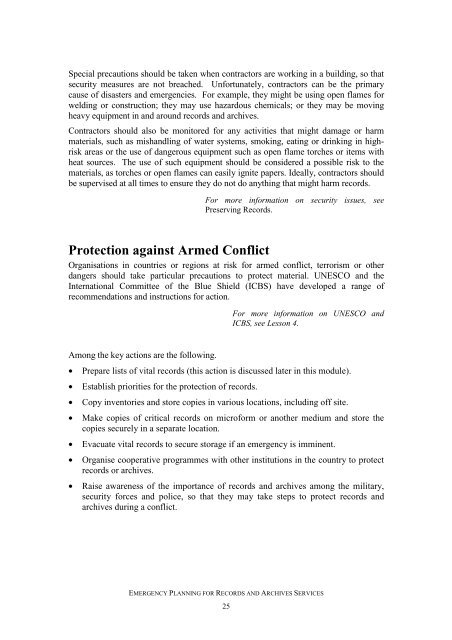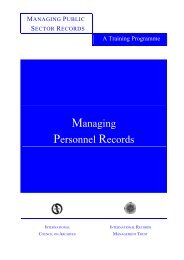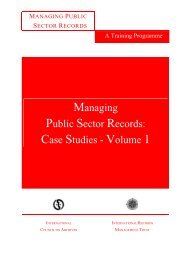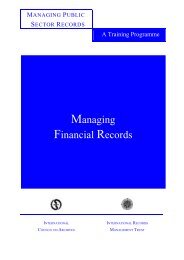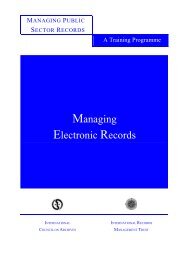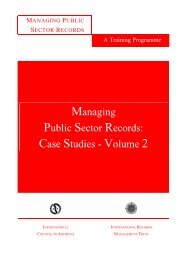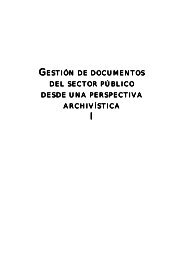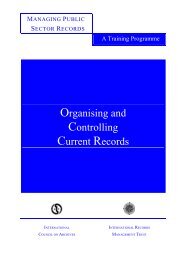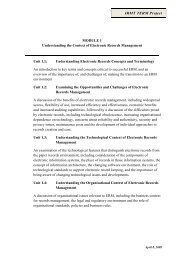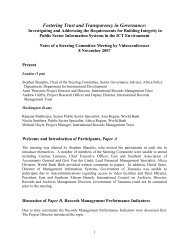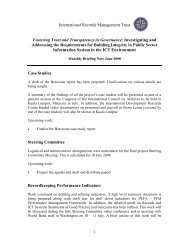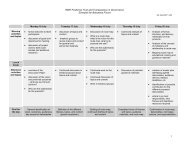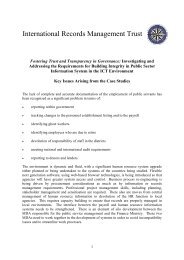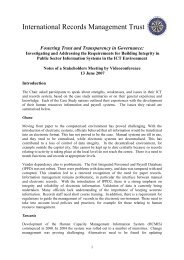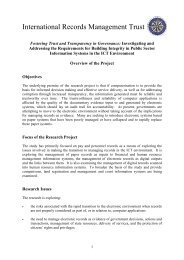disaster planning and control - International Records Management ...
disaster planning and control - International Records Management ...
disaster planning and control - International Records Management ...
You also want an ePaper? Increase the reach of your titles
YUMPU automatically turns print PDFs into web optimized ePapers that Google loves.
Special precautions should be taken when contractors are working in a building, so that<br />
security measures are not breached. Unfortunately, contractors can be the primary<br />
cause of <strong>disaster</strong>s <strong>and</strong> emergencies. For example, they might be using open flames for<br />
welding or construction; they may use hazardous chemicals; or they may be moving<br />
heavy equipment in <strong>and</strong> around records <strong>and</strong> archives.<br />
Contractors should also be monitored for any activities that might damage or harm<br />
materials, such as mish<strong>and</strong>ling of water systems, smoking, eating or drinking in highrisk<br />
areas or the use of dangerous equipment such as open flame torches or items with<br />
heat sources. The use of such equipment should be considered a possible risk to the<br />
materials, as torches or open flames can easily ignite papers. Ideally, contractors should<br />
be supervised at all times to ensure they do not do anything that might harm records.<br />
For more information on security issues, see<br />
Preserving <strong>Records</strong>.<br />
Protection against Armed Conflict<br />
Organisations in countries or regions at risk for armed conflict, terrorism or other<br />
dangers should take particular precautions to protect material. UNESCO <strong>and</strong> the<br />
<strong>International</strong> Committee of the Blue Shield (ICBS) have developed a range of<br />
recommendations <strong>and</strong> instructions for action.<br />
For more information on UNESCO <strong>and</strong><br />
ICBS, see Lesson 4.<br />
Among the key actions are the following.<br />
• Prepare lists of vital records (this action is discussed later in this module).<br />
• Establish priorities for the protection of records.<br />
• Copy inventories <strong>and</strong> store copies in various locations, including off site.<br />
• Make copies of critical records on microform or another medium <strong>and</strong> store the<br />
copies securely in a separate location.<br />
• Evacuate vital records to secure storage if an emergency is imminent.<br />
• Organise cooperative programmes with other institutions in the country to protect<br />
records or archives.<br />
• Raise awareness of the importance of records <strong>and</strong> archives among the military,<br />
security forces <strong>and</strong> police, so that they may take steps to protect records <strong>and</strong><br />
archives during a conflict.<br />
EMERGENCY PLANNING FOR RECORDS AND ARCHIVES SERVICES<br />
25


